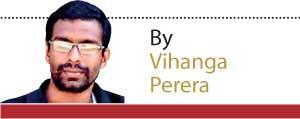24 May 2021 - {{hitsCtrl.values.hits}}
For a young, unstable republic that has seen more years under emergency laws, counter-terrorism and prevention of terrorism acts, white van abductions, charred-black roadside pyres and other “deaths without addresses”, Sri Lankan scholarship pays scant heed to what in law and political science is called the “state of exception”. In recent theory, scholars like Giorgio Agamben have led discussions on how modern states foster and maintain conditions to play politics “outside the law” without its – in that sense – being illegal. Agamben, in particular, develops this discussion in, among others, “Homo Sacer” and “The State of Exception”. His scholarship taken over from an academic conversation that comes from the 1920s, to which theorists like Carl Schmitt, Walter Benjamin, Hannah Arendt, and – later – Michel Foucault have contributed.
of terrorism acts, white van abductions, charred-black roadside pyres and other “deaths without addresses”, Sri Lankan scholarship pays scant heed to what in law and political science is called the “state of exception”. In recent theory, scholars like Giorgio Agamben have led discussions on how modern states foster and maintain conditions to play politics “outside the law” without its – in that sense – being illegal. Agamben, in particular, develops this discussion in, among others, “Homo Sacer” and “The State of Exception”. His scholarship taken over from an academic conversation that comes from the 1920s, to which theorists like Carl Schmitt, Walter Benjamin, Hannah Arendt, and – later – Michel Foucault have contributed.
"The war gave the state leverage over time to appropriate the resources of those provinces, to play with demographics, and to militarize the land"
Since a newspaper column is not the best space for a crash course on an academic debate, let me instead highlight upfront how the state of exception relates to Sri Lanka. A state of exception can be argued to be in play where, in favour of the state, ordinary law is either suspended, bypassed, or disregarded; or where formal institutions are substituted by shadow organizations. One relatable example lies in torture and incarceration camps during emergencies, which were run by a combination of legal militia and paramilitary operatives. In studying disappearances in Sri Lanka, several scholars have argued that in situations like the political turbulence in the late-1980s, the government at the time had in place a “shadow state”: a mechanism outside the constitutional and established process and depended on an unorthodox and non-institutional apparatus. In these situations, constitutional processes get diminished, official channels are disempowered, and a word and voice that bypasses circulars is heard to command.
 Viewed in this way, the state of exception is a political philosophy: it is the real politik of Sri Lanka as a republic, and every chaotic milestone we have experienced as a nation – from racial riots to post-war nostalgias – have contributed to the state’s call for exception and its use in shaping and steering mass imagination. The most familiar elephant in the room is the three decade long war in north-eastern Sri Lanka. The war gave the state leverage over time to appropriate the resources of those provinces, to play with demographics, and to militarize the land. After a 30-year war, some of the most lucrative businesses in the north and east are in the hands of aliens to those regions. There is a strong military presence in industries, social and cultural life. The war also caused large scale migration and exile of northern and eastern persons. In instances, vacuums created by these migrations have been filled by internal migrations and settlements. During the war, new laws assisting, de facto conditions exploited to its advantage assisted the state to walk through many barriers set by democracies as social safeguards. While a manufactured and continued war programme ascertained a cause for continuing this power programme, these laws made surveillance and encroachment on civil liberties a “call of duty”.
Viewed in this way, the state of exception is a political philosophy: it is the real politik of Sri Lanka as a republic, and every chaotic milestone we have experienced as a nation – from racial riots to post-war nostalgias – have contributed to the state’s call for exception and its use in shaping and steering mass imagination. The most familiar elephant in the room is the three decade long war in north-eastern Sri Lanka. The war gave the state leverage over time to appropriate the resources of those provinces, to play with demographics, and to militarize the land. After a 30-year war, some of the most lucrative businesses in the north and east are in the hands of aliens to those regions. There is a strong military presence in industries, social and cultural life. The war also caused large scale migration and exile of northern and eastern persons. In instances, vacuums created by these migrations have been filled by internal migrations and settlements. During the war, new laws assisting, de facto conditions exploited to its advantage assisted the state to walk through many barriers set by democracies as social safeguards. While a manufactured and continued war programme ascertained a cause for continuing this power programme, these laws made surveillance and encroachment on civil liberties a “call of duty”.
If one gave it some thought, a few negligible intervals notwithstanding, all of Sri Lanka’s modern history, from 1971 to the present – has been an evolving concentration camp. Sanitized within the prolonged and familiarized play of exception our morality and psyche, too, have played into the omnipresence of violence. Think of the everyday situations – like the school or the work place – where “camp-like behaviour” has been normalized, applauded, and even taken pride in. In “Madness and Civilization” Michel Foucault introduces the asylum and the idea of madness as a constructed space (and condition) to police societies to a desired state formula. Foucault later extended this analysis to include other modern social institutions among which the school is a key space. In Sri Lanka, schools – in their structure and in its placement in the grid – have an alarming similarity with both the lunatic asylum and the concentration camp. While students in these places are force-fed a tasteless, state-brew syrup for 13 years as (mis)education, they are hemmed in by visible and invisible rounds of barbed wire including so-called school discipline, school good name, rigid and taciturn rules (prerogatives of arbitrary agents such as teachers and the top management), and – least of all – that spectacular sub-species of mammals that are called prefects. These latter – decorated officers chosen from within the camp – are the teenage equivalent of the gas-chamber operators of Auschwitz. Sadly, they are proud of their badge and urge their sons and daughters to be the same.
"If one gave it some thought, a few negligible intervals notwithstanding, all of Sri Lanka’s modern history, from 1971 to the present – has been an evolving concentration camp"
The rag – as a cultural phenomenon – further illustrates the depths to which the camp has cut through our social imagination. More commonly associated with university subculture, public and private ragging is nonetheless widespread in schools, institutions, professional organizations and so on. During the time outbound trainings became a fad in Sri Lankan institutes immediate post-war, I used to teach at a suburban university. It was amusing that university staff – especially junior academics – were firmly directed towards the hanging ropes and monkey bars. It was more or less seen as a compulsory workshop. The training had a palpably watered-down military-style vibe with camp-culture at its heart. The thinness of the line, which demarcates our university/school from a camp, however, is so slim that it was no great Freudian slip that some schools and universities were used as concentration and torture camps during 1971 and 1989-90.
"There is a new bill in the offing to empower the John Kothalawala Defence University – initially, a military academy – as an autonomous body freed from purview and mediation of the University Grants Commission: almost a variant in education of a “freed zone”
The imagination of Sri Lanka as a concentration camp should not be taken too lightly. There is a new bill in the offing to empower the John Kothalawala Defence University – initially, a military academy – as an autonomous body freed from purview and mediation of the University Grants Commission: almost a variant in education of a “freed zone”. I saw a recent press communication by the university teachers’ trade union cautioning against this bill. If this bill is passed and the KDU breaks free, it is my hope that it will still offer a course on Agamben.
29 Nov 2024 17 minute ago
29 Nov 2024 2 hours ago
29 Nov 2024 2 hours ago
29 Nov 2024 3 hours ago
29 Nov 2024 3 hours ago